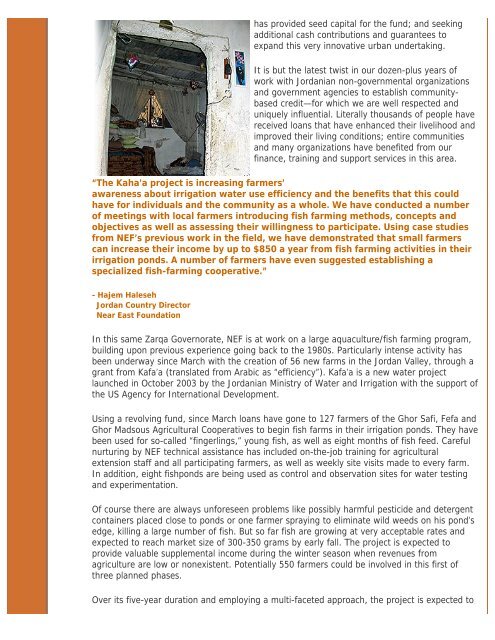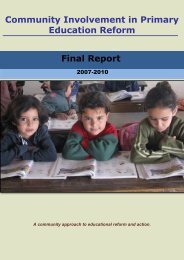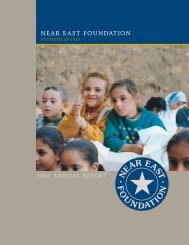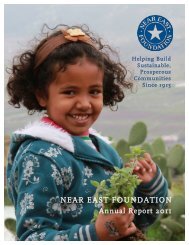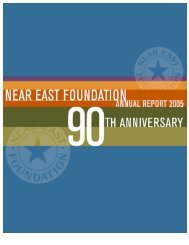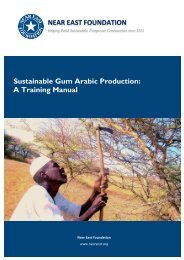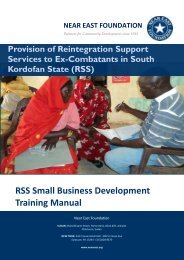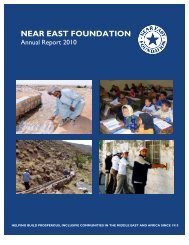NEF 2004 Annual Report - Near East Foundation
NEF 2004 Annual Report - Near East Foundation
NEF 2004 Annual Report - Near East Foundation
Create successful ePaper yourself
Turn your PDF publications into a flip-book with our unique Google optimized e-Paper software.
has provided seed capital for the fund; and seeking<br />
additional cash contributions and guarantees to<br />
expand this very innovative urban undertaking.<br />
It is but the latest twist in our dozen-plus years of<br />
work with Jordanian non-governmental organizations<br />
and government agencies to establish communitybased<br />
credit—for which we are well respected and<br />
uniquely influential. Literally thousands of people have<br />
received loans that have enhanced their livelihood and<br />
improved their living conditions; entire communities<br />
and many organizations have benefited from our<br />
finance, training and support services in this area.<br />
“The Kaha’a project is increasing farmers’<br />
awareness about irrigation water use efficiency and the benefits that this could<br />
have for individuals and the community as a whole. We have conducted a number<br />
of meetings with local farmers introducing fish farming methods, concepts and<br />
objectives as well as assessing their willingness to participate. Using case studies<br />
from <strong>NEF</strong>’s previous work in the field, we have demonstrated that small farmers<br />
can increase their income by up to $850 a year from fish farming activities in their<br />
irrigation ponds. A number of farmers have even suggested establishing a<br />
specialized fish-farming cooperative.”<br />
- Hajem Haleseh<br />
Jordan Country Director<br />
<strong>Near</strong> <strong>East</strong> <strong>Foundation</strong><br />
In this same Zarqa Governorate, <strong>NEF</strong> is at work on a large aquaculture/fish farming program,<br />
building upon previous experience going back to the 1980s. Particularly intense activity has<br />
been underway since March with the creation of 56 new farms in the Jordan Valley, through a<br />
grant from Kafa’a (translated from Arabic as “efficiency”). Kafa’a is a new water project<br />
launched in October 2003 by the Jordanian Ministry of Water and Irrigation with the support of<br />
the US Agency for International Development.<br />
Using a revolving fund, since March loans have gone to 127 farmers of the Ghor Safi, Fefa and<br />
Ghor Madsous Agricultural Cooperatives to begin fish farms in their irrigation ponds. They have<br />
been used for so-called “fingerlings,” young fish, as well as eight months of fish feed. Careful<br />
nurturing by <strong>NEF</strong> technical assistance has included on-the-job training for agricultural<br />
extension staff and all participating farmers, as well as weekly site visits made to every farm.<br />
In addition, eight fishponds are being used as control and observation sites for water testing<br />
and experimentation.<br />
Of course there are always unforeseen problems like possibly harmful pesticide and detergent<br />
containers placed close to ponds or one farmer spraying to eliminate wild weeds on his pond’s<br />
edge, killing a large number of fish. But so far fish are growing at very acceptable rates and<br />
expected to reach market size of 300-350 grams by early fall. The project is expected to<br />
provide valuable supplemental income during the winter season when revenues from<br />
agriculture are low or nonexistent. Potentially 550 farmers could be involved in this first of<br />
three planned phases.<br />
Over its five-year duration and employing a multi-faceted approach, the project is expected to


